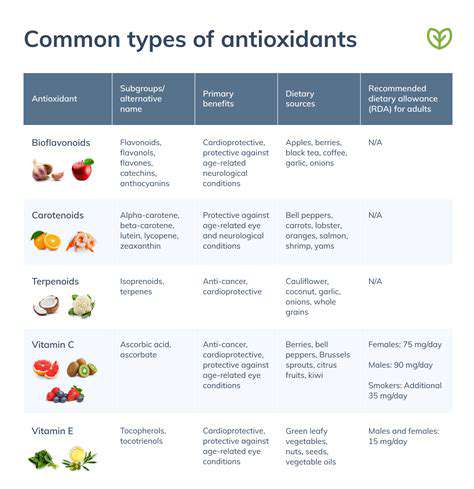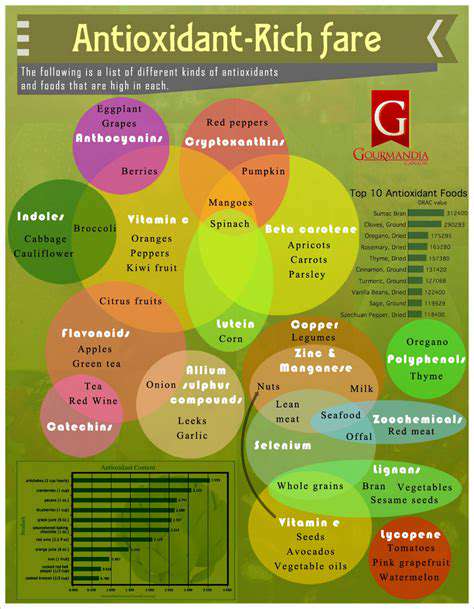Understanding Antioxidants: Boosting Health
While whole foods provide antioxidant packages perfected by evolution, supplements can play a supporting role. However, nature rarely delivers nutrients in isolation. That vitamin C tablet lacks the flavonoids and co-factors found in an orange. Smart supplementation means working with healthcare providers to identify genuine needs rather than following marketing trends.
The Role of Antioxidants in Aging
Aging isn't just about time passing - it's about accumulated cellular damage. Antioxidants help slow this damage, like applying a protective coating to a vintage car. They don't stop the clock, but they help maintain cellular youthfulness longer. Regular antioxidant intake from colorful foods may help preserve both how we feel and how we look as we age.
Common Sources of Antioxidants in Your Diet

Berries
Nature's candy packs a serious antioxidant punch. Blueberries contain anthocyanins that may cross the blood-brain barrier, offering potential cognitive benefits. Strawberries deliver ellagic acid, while raspberries provide ellagitannins. Frozen berries retain most antioxidants, making them practical year-round options. For maximum benefit, enjoy different colored berries - each hue represents distinct protective compounds.
Fruits and Vegetables
Brightly colored produce acts as nature's antioxidant alert system. Orange citrus fruits offer hesperidin along with vitamin C. Dark leafy greens provide lutein for eye health. Cruciferous vegetables contain sulforaphane, which boosts the body's own antioxidant defenses. Eating seasonally ensures you get rotating varieties of these protective compounds throughout the year.
Nuts and Seeds
These concentrated nutrition packages deliver antioxidants alongside healthy fats. Almonds provide vitamin E in its most bioavailable form. Walnuts contain unique polyphenols, while sunflower seeds offer selenium. Soaking nuts overnight can increase antioxidant availability while improving digestibility. For maximum benefit, choose raw or dry-roasted varieties without added oils.
Dark Chocolate
Cocoa contains more antioxidants than many fruits when measured by weight. The key is choosing varieties with at least 70% cocoa content. Interestingly, the roasting process that creates chocolate's rich flavor also increases certain antioxidant compounds. Enjoy small portions as part of a balanced diet, preferably earlier in the day when metabolism is highest.
Beyond Diet: Exploring Antioxidant Supplements
Beyond the Basics: Understanding Antioxidant Mechanisms
Antioxidant science reveals complex interactions within our biological systems. These compounds don't work in isolation - they form part of intricate defense networks. Some antioxidants specialize in certain cellular compartments, while others are recycled by fellow antioxidants. This complexity explains why whole food sources often outperform isolated supplements.
Supplement Types and Potential Benefits
The supplement aisle offers concentrated forms of various antioxidants, each with unique considerations. Vitamin C supplements come in different forms with varying absorption rates. Vitamin E exists in multiple isomers, with natural forms being more effective. Emerging research on specialized antioxidants like astaxanthin shows promise for specific applications. Always consider your individual health status before supplementing.
Safety and Potential Drawbacks
More isn't always better with antioxidants. High-dose vitamin E may increase bleeding risk in some individuals. Beta-carotene supplements showed unexpected effects in smokers. The supplement industry's more is better approach often contradicts scientific evidence. Professional guidance helps navigate these complexities safely.
The Role of Diet in Antioxidant Intake
Whole foods provide antioxidants in balanced proportions perfected by nature. Tomato's lycopene becomes more available when cooked with olive oil. Green tea's catechins work synergistically with its L-theanine. These food synergies demonstrate nature's wisdom in packaging antioxidants. Focus first on building antioxidant-rich eating patterns before considering supplements.
Harnessing Antioxidants for a Healthier Lifestyle

Harnessing the Power of Natural Antioxidants
Strategic lifestyle choices can maximize your antioxidant benefits. Cooking methods matter - steaming preserves more nutrients than boiling. Storage conditions affect antioxidant levels - many degrade with light and heat exposure. Even chewing thoroughly can increase antioxidant release from plant foods.
The Role of Antioxidants in Cellular Health
Antioxidants support cellular resilience against modern stressors. They help mitigate damage from environmental toxins, psychological stress, and even excessive exercise. This cellular protection forms the foundation for long-term healthspan and vitality. Consider antioxidants as part of your overall stress resilience strategy.
Dietary Sources of Powerful Antioxidants
Some less familiar foods offer exceptional antioxidant value. Spices like cloves and cinnamon rank surprisingly high. Herbs like oregano and rosemary contain potent compounds. Even mushrooms like shiitake provide unique antioxidants. Expanding your culinary repertoire can significantly boost antioxidant diversity.
Beyond Diet: Lifestyle Choices for Antioxidant Support
Non-diet factors significantly influence antioxidant effectiveness. Quality sleep enhances antioxidant enzyme production. Stress reduction prevents excessive free radical generation. Even hydration status affects antioxidant transport throughout the body. A holistic approach yields the best results.
The Importance of Antioxidant Supplements
Targeted supplementation makes sense in specific situations. Athletes may benefit from additional vitamin C during intense training. Smokers might need extra vitamin E. The key is personalization based on individual needs and lifestyle factors. Generic high-dose antioxidant protocols often disappoint in research studies.
Understanding Antioxidant Interactions and Synergies
Antioxidants work best in teams. Vitamin C regenerates vitamin E after it neutralizes free radicals. Selenium enhances glutathione peroxidase activity. This biochemical teamwork explains why isolated supplements often underperform compared to whole foods. Aim for broad-spectrum antioxidant intake.
Potential Risks and Considerations
Balance remains essential with antioxidants. Excessive intake from supplements may disrupt delicate redox balance. Some antioxidants act as pro-oxidants in certain conditions. Respect antioxidants as powerful compounds that require thoughtful use. When in doubt, food sources provide the safest delivery system.